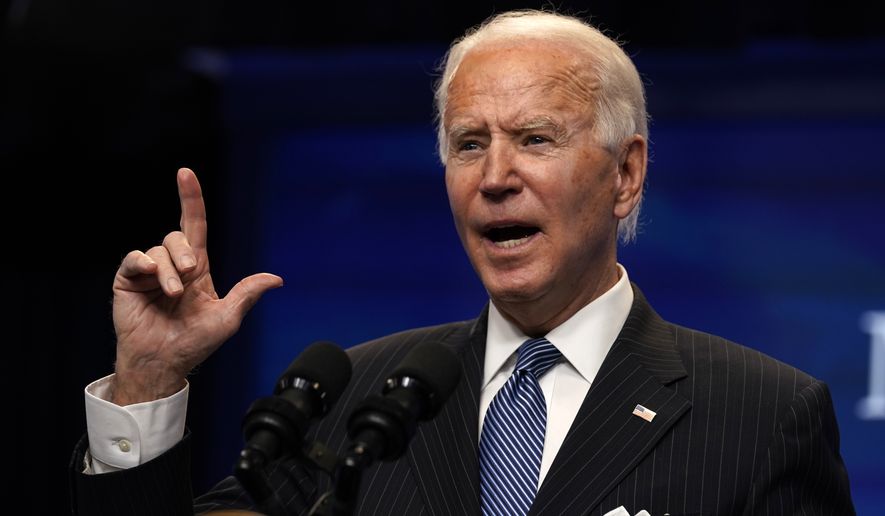President Biden on Wednesday said “environmental justice” for people of color will be a central feature of his efforts to combat climate change, again putting skin color and racial justice front and center in his early policy and personnel decisions.
Mr. Biden’s early focus on what he calls “systemic racism and white supremacy” in America generated pushback from critics and scholars who say they don’t need a lecture from the commander-in-chief about the country’s racial history.
“It’s like the Great Society for identity politics,” said Mike Gonzalez, a member of former President Trump’s newly disbanded 1776 Commission. “It is very difficult to call your people racist and then turn around and say I want to unify you.”
One of Mr. Biden’s first acts in office was to abolish what he called the “offensive, counter-factual 1776 Commission” that Mr. Trump had set up to try to restore “patriotic education” at national parks and in schools across the country.
“Unity and healing must begin with understanding and truth, not ignorance and lies,” Mr. Biden said Tuesday when announcing more of his racial justice agenda.
Historians have criticized the 1776 Commission’s report, released last week, as lacking critical context and glossing over slavery and the mistreatment of Native Americans as part and parcel of the American story.
Mr. Gonzalez challenged Mr. Biden to point to any specific inaccuracies in the panel’s work.
“History can be debated, but historical facts exist,” he said. “You cannot all of a sudden find the word slavery in a Constitution that does not mention slavery.”
Mr. Biden and his team say that they are righting wrongs embedded in American history and U.S. policy. They say the country needs to acknowledge practices such as “redlining” in which minority communities are denied bank loans or government services. Those practices were outlawed by the Fair Housing Act of 1968.
Mr. Biden said the country has tolerated the “narrow, cramped” view that America is a zero-sum game where if one group gets lifted up, someone else necessarily gets shoved aside.
“We’ve lost sight of what President Kennedy told us when he said, ‘A rising tide lifts all boats,’” he said. “We need to make the issue of racial equity not just an issue for any one department of government; it has to be the business of the whole of government.”
Terry Schilling, executive director of the American Principles Project, said Mr. Biden isn’t interested in easing racial tensions and that he’s simply playing to the base of the Democratic Party.
“The least effective way to unify the country is by attacking half of its citizens as being racists and white supremacists,” Mr. Schilling said. “Yes, America has her scars. We’ve screwed up in the past. But we’ve worked aggressively to fix that and address those problems.”
Race-based government spending, such as prioritizing minority-owned businesses in distributing coronavirus relief, also could be counterproductive, he said.
“Eighty percent of all small businesses are owned by White people,” Mr. Schilling said. “That’s not unity.”
Racial justice advocates and the Democratic Party’s left wing are demanding more action to erase economic disparities between White and Black Americans.
Susan Rice, who leads the White House Domestic Policy Council, said the administration’s actions aren’t simply “feel-good policies” and that righting racial wrongs lifts everyone.
It is estimated that the U.S. economy has lost $16 trillion over the last 20 years because of discrimination against “families of color,” Ms. Rice said.
“If we closed racial gaps in income and opportunity, these same economists have estimated we could add $5 trillion to the U.S. economy over the next five years and add over 6 million new jobs for all Americans,” she said.
Charles Blaine, president of the Urban Reform Institute, a Houston-based think tank, said it is not surprising that the new Democratic administration is bandying about terms such as “White supremacy” and “systemic racism” because it’s what the party has run on for decades.
There is a major disconnect, however, between the White progressives who run the Democratic Party and the minorities they claim to represent, he said.
“It’s frustrating because the Democrats are often stereotyped as the party that helps minorities, but what you hear in the language of the elite at the top isn’t language or policies that actively improve the lives of minorities,” Mr. Blaine said. “I think that type of rhetoric — when a lot of folks hear it they immediately are turned off and their ears are shut down to that.”
Some Republican lawmakers also bristle at Mr. Biden returning to the rhetoric of racial division.
Sen. Marco Rubio slammed Mr. Biden for saying the police at the U.S. Capitol on Jan. 6 would have treated the rioters much differently had they been Black Lives Matter activists.
“You know what that does? That makes everybody bow up and go back to their corner,” the Florida Republican said on Fox News. “A lot of people are thinking to themselves, maybe politics has gotten too hot right now, and then you come out with a speech like that, and I don’t think that does any good for anybody.”
Many of the people who have been arrested for their roles in the Jan. 6 attack have been identified as having ties to right-wing and White supremacist groups.
The Department of Homeland Security issued a threat bulletin on Wednesday warning of threats from “domestic violent extremists” who have been driven by “long-standing racial and ethnic tension.”
Mr. Trump’s DHS also agreed that White supremacists pose a grave national security threat to the country.
In a threat assessment released in October, DHS said racially and ethnically motivated violent extremists — specifically “White supremacist extremists” — remain the most “persistent and lethal threat” facing the country.
• David Sherfinski can be reached at dsherfinski@washingtontimes.com.
• James Varney can be reached at jvarney@washingtontimes.com.




Please read our comment policy before commenting.